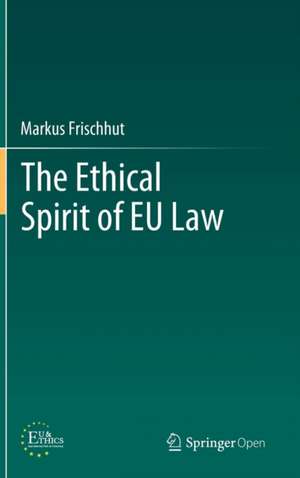The Ethical Spirit of EU Law
Autor Markus Frischhuten Limba Engleză Hardback – 26 mar 2019
This raises the question to which extent the content of these references is determined and whether it is possible to identify an ethical spirit of EU law. Answering that question, in turn, entails addressing the following questions: In references to ethics concerning EU law, can we identify references to a particular theory of practical philosophy at all; and, if so, to one or more normative ethical theories (deontology, consequentialism, or virtue ethics)? Further, should these non-legal concepts be imported in an unaltered way (“absolute approach”), or be adapted to the legal context (“relative approach”)?
This book explores the different layers of EU law (primary law, agreements, secondary law, and tertiary law), including the role of ethics in EU lawmaking and in EU case law, as well as the implementation of relevant EU directives in selected Member States. In addition to the above-mentioned normative philosophical lens, the book also analyzes the findings from the legal lens of EU integration, i.e., especially EU values, human rights and the cornerstone of human dignity.
Preț: 421.93 lei
Nou
Puncte Express: 633
Preț estimativ în valută:
80.74€ • 86.34$ • 67.32£
80.74€ • 86.34$ • 67.32£
Carte tipărită la comandă
Livrare economică 17 aprilie-01 mai
Preluare comenzi: 021 569.72.76
Specificații
ISBN-13: 9783030105815
ISBN-10: 3030105814
Pagini: 142
Ilustrații: XIX, 157 p. 15 illus., 12 illus. in color.
Dimensiuni: 155 x 235 mm
Greutate: 0.43 kg
Ediția:1st ed. 2019
Editura: Springer International Publishing
Colecția Springer
Locul publicării:Cham, Switzerland
ISBN-10: 3030105814
Pagini: 142
Ilustrații: XIX, 157 p. 15 illus., 12 illus. in color.
Dimensiuni: 155 x 235 mm
Greutate: 0.43 kg
Ediția:1st ed. 2019
Editura: Springer International Publishing
Colecția Springer
Locul publicării:Cham, Switzerland
Cuprins
Setting the agenda.- Normative theories of practical philosophy.- Status quo of ethics and morality in EU law.- Philosophical Lens.- Legal lens.- Conclusion and suggestions for improvement.
Textul de pe ultima copertă
This open access book seeks to identify the ethical spirit of European Union (EU) law, a context in which we can observe a trend towards increasing references to the terms ‘ethics’ and ‘morality.’ This aspect is all the more important because EU law is now affecting more and more areas of national law, including such sensitive ones as the patentability of human life. Especially when unethical behaviour produces legal consequences, the frequent lack of clearly defined concepts remains a challenge, particularly against the background of the principle of legal certainty.
This raises the question to which extent the content of these references is determined and whether it is possible to identify an ethical spirit of EU law. Answering that question, in turn, entails addressing the following questions: In references to ethics concerning EU law, can we identify references to a particular theory of practical philosophy at all; and, if so, to one or more normative ethical theories (deontology, consequentialism, or virtue ethics)? Further, should these non-legal concepts be imported in an unaltered way (“absolute approach”), or be adapted to the legal context (“relative approach”)?
This book explores the different layers of EU law (primary law, agreements, secondary law, and tertiary law), including the role of ethics in EU lawmaking and in EU case law, as well as the implementation of relevant EU directives in selected Member States. In addition to the above-mentioned normative philosophical lens, the book also analyzes the findings from the legal lens of EU integration, i.e., especially EU values, human rights and the cornerstone of human dignity.
Caracteristici
The first comprehensive analysis of the approach that EU law takes concerning ethics Includes a detailed analysis of opinions of the European Commission’s ethics advisory board Offers a concise summary of an extensive research project, illustrated with a wealth of figures and tables
